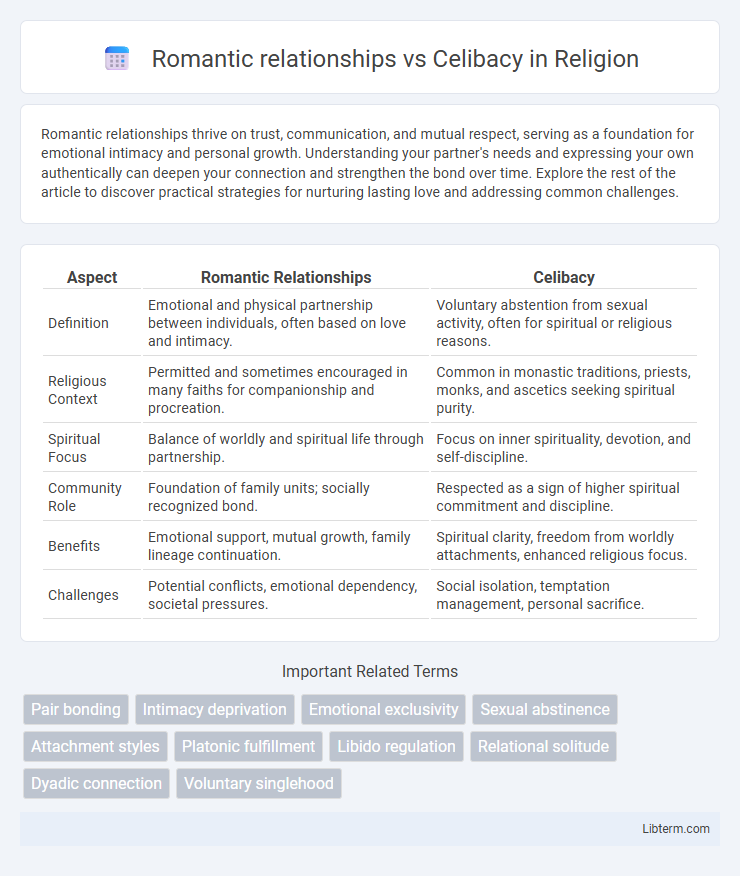Romantic relationships thrive on trust, communication, and mutual respect, serving as a foundation for emotional intimacy and personal growth. Understanding your partner's needs and expressing your own authentically can deepen your connection and strengthen the bond over time. Explore the rest of the article to discover practical strategies for nurturing lasting love and addressing common challenges.
Table of Comparison
| Aspect | Romantic Relationships | Celibacy |
|---|---|---|
| Definition | Emotional and physical partnership between individuals, often based on love and intimacy. | Voluntary abstention from sexual activity, often for spiritual or religious reasons. |
| Religious Context | Permitted and sometimes encouraged in many faiths for companionship and procreation. | Common in monastic traditions, priests, monks, and ascetics seeking spiritual purity. |
| Spiritual Focus | Balance of worldly and spiritual life through partnership. | Focus on inner spirituality, devotion, and self-discipline. |
| Community Role | Foundation of family units; socially recognized bond. | Respected as a sign of higher spiritual commitment and discipline. |
| Benefits | Emotional support, mutual growth, family lineage continuation. | Spiritual clarity, freedom from worldly attachments, enhanced religious focus. |
| Challenges | Potential conflicts, emotional dependency, societal pressures. | Social isolation, temptation management, personal sacrifice. |
Defining Romantic Relationships and Celibacy
Romantic relationships involve emotional and physical intimacy characterized by love, affection, and commitment between partners, often including dating, cohabitation, or marriage. Celibacy is the voluntary choice to abstain from sexual activity and romantic involvement, commonly practiced for personal, spiritual, or health reasons. Defining these terms highlights contrasts in intimacy, emotional engagement, and lifestyle priorities.
Historical Perspectives on Love and Abstinence
Historical perspectives on romantic relationships reveal diverse cultural attitudes toward love, often intertwined with societal norms and religious beliefs about celibacy. In many ancient civilizations, romantic love was idealized in literature and art, yet celibacy was revered within religious contexts for spiritual purity, as seen in monastic traditions across Christianity and Buddhism. The tension between romantic engagement and abstinence reflects enduring debates about the role of physical intimacy versus spiritual or emotional fulfillment throughout history.
Psychological Benefits of Romantic Partnerships
Romantic relationships contribute significantly to psychological well-being by providing emotional support, fostering a sense of belonging, and enhancing self-esteem through intimate connections. Studies reveal that individuals in healthy romantic partnerships exhibit lower stress levels, reduced symptoms of depression, and improved overall mental health compared to those who are celibate. The presence of consistent companionship and affectionate bonding in romantic relationships promotes the release of oxytocin and serotonin, hormones linked to happiness and emotional resilience.
Emotional Growth through Celibacy
Celibacy fosters profound emotional growth by encouraging self-reflection and heightened emotional awareness outside the dynamics of romantic relationships. This practice allows individuals to develop resilience, self-control, and deeper self-understanding without the distractions of romantic attachment. Emotional maturity cultivated through celibacy can lead to healthier future relationships and enhanced mental well-being.
Health and Wellbeing: Comparison of Both Lifestyles
Romantic relationships often contribute to improved mental health by providing emotional support and reducing stress, which can enhance overall well-being and longevity. Celibacy, on the other hand, may promote physical health benefits such as lower risk of sexually transmitted infections and increased focus on personal growth and mindfulness. Both lifestyles offer unique advantages for emotional balance, with romantic relationships fostering social connectivity and celibacy encouraging self-discipline and mental clarity.
Social Expectations and Cultural Influences
Romantic relationships often align with social expectations that emphasize partnership, emotional intimacy, and family formation, reinforced by cultural narratives and media portrayals. Celibacy challenges these norms by prioritizing personal or spiritual growth over traditional romantic roles, frequently influenced by religious beliefs or countercultural movements. Societies with strong communal values may exert pressure to conform to relationship models, while diverse cultural contexts offer varying degrees of acceptance for celibate lifestyles.
Challenges in Romantic Relationships
Romantic relationships often face challenges such as communication breakdowns, trust issues, and differing expectations, which can lead to emotional stress and conflict. Balancing personal needs with those of a partner requires ongoing effort and understanding, making vulnerability and compromise essential yet difficult. Unlike celibacy, which emphasizes self-control and solitude, romantic partnerships demand continuous emotional investment that can amplify both joy and potential hardships.
Rewards and Fulfillment in Celibate Living
Celibate living offers profound emotional clarity and self-mastery, allowing individuals to channel energy into personal growth and spiritual fulfillment without the complexities of romantic attachments. Studies show that celibacy can enhance mental resilience and foster deep introspection, contributing to sustained inner peace and long-term contentment. This lifestyle emphasizes self-reliance and mindful presence, providing unique rewards often absent in romantic relationships, such as uninterrupted focus on goals and authentic self-connection.
Finding Personal Meaning: Choosing a Path
Navigating romantic relationships and celibacy involves introspection to find personal meaning aligned with individual values and life goals. Romantic relationships often provide emotional connection and shared experiences that can enhance self-discovery and fulfillment. Celibacy offers a path of self-discipline and focus, fostering personal growth and clarity without external relational influences.
Myths and Facts about Love and Celibacy
Romantic relationships often face myths such as the belief that love guarantees perpetual happiness or that celibacy equates to loneliness; however, facts reveal that healthy relationships require ongoing effort and celibacy can foster personal growth and self-awareness. Scientific studies highlight that love triggers complex neurochemical responses, yet emotional fulfillment does not solely depend on romantic involvement, as celibate individuals report high levels of contentment and emotional stability. Psychological research dispels misconceptions by showing that both romantic engagement and celibate lifestyles can lead to meaningful connections and well-being, depending on individual values and circumstances.
Romantic relationships Infographic

 libterm.com
libterm.com